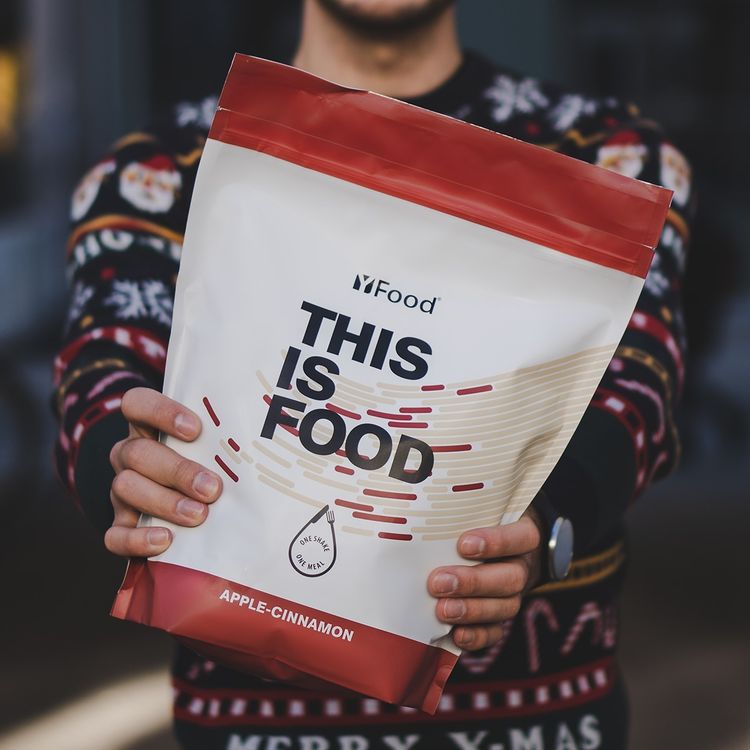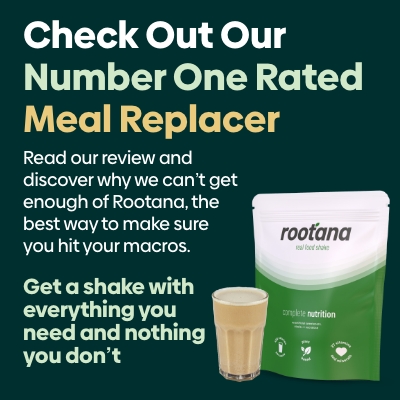
This YFood meal replacement shake review will help you to decide whether it is the right shake for you or not. We recently reviewed the five best meal replacement shakes. Check it out here.
YFood is a meal replacement shake that is produced in Germany. It has a reputation for great-tasting products, sold for a very reasonable price. But how good is YFood? What are the ingredients like? Does YFood deliver on its promises? And are there any alternatives that you should consider instead? This YFood meal replacement shake review will take a look at each question in turn.
YFood Meal Replacement at a Glance
YFood meal replacement shakes contain 400 calories per serving, with 18 grams of fat, 30 grams of carbohydrates, and 26 grams of protein. There are also 7.1 grams of fibre per serving and 15 grams of sugar. They offer an original and a vegan option, and there are 8 different flavours to choose from.
Pros
- Great tasting shakes
- High in protein
- Excellent price per serving
- The starter pack allows you to try each shake
- Offers a vegan option
Cons
- Very high in sugars
- Very high-fat percentage (40.5%)
- Cheap ingredients
- Low-quality carbs
Who Should Use YFood Meal Replacement Shakes?
Ostensibly, anyone can use YFood meal replacement shakes unless you have a specific allergy. They offer plant-based, gluten-free meal replacement shakes in a variety of flavours. But YFood has a lot of competition in this market, and it doesn’t particularly shine brightly.
YFood is probably best suited to people who want meal replacement shakes but have a tight budget. YFood is one of the lowest-priced meal replacement shakes on the market. This is evident in their ingredient list, but if you aren’t too fussed about sugar and artificial sweeteners, you are getting a bargain.
YFood Meal Replacement Shakes Ingredients
There are a LOT of ingredients in YFood, so many that it would be foolish to list them all here. So we will stick with the most important ones. By the way, a very long ingredient list is rarely a good thing when it comes to meal replacement shakes!
YFood sells an original version and a vegan shake. The main difference between the two is that the Original uses milk for protein while the vegan version uses soy. There is also tapioca starch in the vegan shakes, which is used as a carb and fibre source as well as providing a creamy consistency.
Milk Protein
Both whey and casein protein comes from milk. It is highly digestible, provides a complete amino acid profile, and due to its low cost, it can help to keep the price per serving nice and low. Using milk protein can also help to improve the taste, which is one reason why YFood shakes taste so good.
Rapeseed Oil
YFood is a German meal replacement shake, so it uses rapeseed oil which is the most common oil produced in Germany. Rapeseed oil is fairly healthy and is an excellent source of vitamins A, E, and K.
Sunflower Oil
This is a very common ingredient in meal replacement shakes. Sunflower oil is high in omega-6 and omega-9 fatty acids and is an excellent source of antioxidants. Like rapeseed oil, sunflower oil is high in vitamins A, E, and K.
Chicory Root Fibre
This is a gluten-free source of fibre, which is designed to help increase satiety after a meal. Fibre can also reduce levels of bad cholesterol and help to prevent heart disease.
Coconut Milk
A source of healthy fats and carbohydrates, coconut milk can also help to improve the taste of your meal replacement shake.
Gluten-Free Oat Fibre
Most meal replacement shakes these days use oat powder due to its many health benefits. However, because YFood gets most of its carbohydrates from maltodextrin, they only include oat fibre. Now, oat fibre has many health benefits, but it’s a real shame that they have avoided using whole oats in an attempt to cut costs.
Modified Starch
YFood is very vague about where its modified starch comes from, stating that it “is obtained by certain processing steps”. It is used as a carbohydrate source but has few of the nutritional benefits of real food carbohydrate sources.
Vitamins & Minerals
YFood contains 13 vitamins and 13 minerals, for a total of 26. This is pretty standard for meal replacement shakes, helping you to avoid nutritional deficiencies.
Maltodextrin
Maltodextrin is a multi-chain carbohydrate that comes from vegetable starch. It is known for having an even higher GI score than table sugar! It is a common ingredient in processed foods, and to be honest, it’s not the sort of ingredient that you really want in a meal replacement shake.
Sucralose
This is an artificial sweetener that is used in many meal replacement shakes. As artificial sweeteners go, it is pretty neutral. Sucralose is created in a lab by artificially increasing the sweetness of regular sugar until it is 600x sweeter.
This means that you only need to use 1/600th to create the same amount of sweetness, making it virtually calorie-free.
Natural Flavourings
Depending on what flavour you choose, you will find a different natural flavouring in your shake. For a chocolate shake, you get natural cocoa. Raspberry puree is used in the berry flavour, and banana powder is used in the banana flavour.
How to Take YFood Meal Replacement Shakes
YFood recommends that you mix 300 ml of water with four tablespoons of powder, mix them in a shaker, and then place the shaker in the fridge for around 5 minutes. Apparently, this helps the fibre to settle.
This step isn’t mentioned by any other meal replacement shake (as far as we know). We’re not sure if this is an oversight by the other companies or if YFood needs more prep time for some reason.
You can customise your YFood shake by swapping water for milk (or a non-dairy alternative). You can add ice, fruit, vegetables, and spices and then blend them all together to create a smoothie. Of course, this will increase the calories per meal, so keep this in mind.
Are There Any Good Alternatives to YFood?
The biggest issues with YFood are the high sugar content and the many non-natural ingredients. In comparison to this, Rootana really shines. It contains 400 calories, 20 grams of protein, and similar amounts of fibre and healthy fats. It is higher in carbohydrates but uses top-quality ingredients. This makes it healthier than YFood while delivering similar results. Rootana also avoids the use of artificial sweeteners, instead using coconut sugars for sweetness.
Is YFood Safe? Side Effects
Yes, there are no ingredients found in YFood that are dangerous in any way, and thanks to its gluten-free formula, it can also be safely consumed by coeliacs. If you have lactose intolerance or you are allergic to soy, then you may want to avoid it, but this would be the case for most meal replacement shakes, not just YFood.
YFood Meal Replacement Shake Review
YFood is an intriguing meal replacement shake. It is one of the most delicious shakes we have tried, and it is sold at a superb price. The macronutrient split is decent, and it contains all the micronutrients required for a healthy diet.
But it also contains a lot of sugar, uses low-quality ingredients, and doesn’t do enough to stand out from the crowd. There are better alternatives out there, such as Rootana or even Huel. By all means, give it a try, particularly if you have a small budget for meal replacements, but don’t expect to be blown away.
Frequently Asked Questions
Can you lose weight with YFood?
Yes, you can. YFood contains just 400 calories, so if you use it instead of a 500-calorie or 800-calorie meal, you can create a calorie deficit and lose weight. But the rest of your diet needs to support this. You can also use YFood to maintain your weight or even gain weight healthily. It’s up to you and how you use YFood.
Is YFood Keto-friendly?
No. Although YFood is high in fat, it also contains 30 grams of carbohydrates, which is too much for a ketogenic meal. You would struggle to fit this into a ketogenic diet while remaining in ketosis. It is also too high in protein for a ketogenic meal. The ratios are all wrong.
Is YFood gluten-free?
Yes, because it uses gluten-free oat fibre rather than actual oats, it is able to avoid any gluten in its formula. If you are gluten-intolerant, then YFood should be fine.
Can YFood help you build muscle?
Yes, YFood contains 400 calories, 30 grams of carbohydrates, and 25 grams of protein, making it ideal for building muscle. However, it is very difficult to build muscle while in a calorie deficit, so your diet would have to be based around creating a small calorie surplus (unless you are overweight, in which case the high-protein content should allow you to build muscle while in a deficit).




Leave a comment